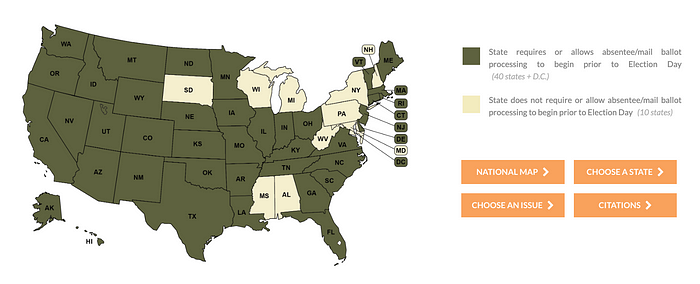Democracy Maps Updates for August 2022
Recent policy and litigation trends on voting and democracy include third-party ballot collection, absentee ballots, voter ID, ballot drop boxes, and felony disenfranchisement. See our issue brief on policy trends shaping voting and elections this year.
These are the Democracy Maps updates as of August 2022

▸▸ Voting by mail
- Ballot tracking for mail voting: Arizona passed legislation to improve the systems that allow voters to track the status of their absentee ballots. Under the new law, each county will be required to provide such a system. When voters can track their ballot they can be confident that their ballot was received, is secure, and will be counted.
45 states provide ballot tracking for mail voting.

- Voting by mail: Pennsylvania’s state Supreme Court rejected a lawsuit that sought to overturn the state’s mail-in voting law passed in 2019, meaning that voters in the state can continue to vote by mail.
- No-excuse absentee voting: Delaware’s governor signed a law that implements no-excuse absentee voting in the state for the first time. The state Republican party has filed a lawsuit challenging the new absentee voting law, but the law remains in effect.
36 states now allow no-excuse absentee voting.

- Online application for absentee ballots: New Jersey enacted a law that allows voters to apply online for an absentee ballot. Other new policies include improvements in counting procedures for absentee ballots.
31 states now provide online applications for absentee ballots.

- Pennsylvania: Lawmakers failed to reach a compromise to allow absentee ballots to be processed in advance of Election Day, which has contributed to delayed election results in the state. Processing absentee ballots in advance involves taking steps such as verifying voter signatures and opening ballot envelopes so that counting can later be done more quickly; it does not include tallying of results in advance.
Only 10 states don’t allow absentee ballots to be processed prior to Election Day.

▸▸ Voting rights for formerly incarcerated people
As the result of a state court of appeals ruling in North Carolina involving felony disenfranchisement, people currently on probation and parole will register to vote. A final decision by the state’s highest court is still pending.

▸▸ Ballot drop boxes
Delaware’s governor signed a law allowing the use of ballot drop boxes. See our policy spotlight on ballot drop boxes.
▸▸ Same-day voter registration
Delaware: A new law took effect allowing same-day voter registration.
21 states and D.C. now allow same-day voter registration.

▸▸ Voter ID
Pennsylvania: Legislators also passed a law that represents the first step in an effort to put a measure on the ballot which would amend the state constitution to require voter ID. The Governor has filed suit alleging the process by which the legislation was passed violates state constitutional rules.
▸▸ Third-party ballot collection
Disabled voters in Wisconsin filed suit in federal court in response to the state supreme court’s decision which imposed severe restrictions on third-party ballot collection (in addition to effectively banning ballot drop boxes). The suit focuses on the ballot collection restrictions, which the plaintiffs argue violate numerous federal laws by disallowing the practice of family members or caregivers returning disabled voters’ ballots.
Only 5 states mandate that only a voter can return their ballot: Alabama, Tennessee, South Dakota, Wisconsin, and Virginia.
However, 28 states have overly restrictive policies on third-party ballot collection.

▸▸ Bans on private grant funding of election offices
Pennsylvania joined the growing number of states enacting bans on private grant funding for election administration. In a shift from other states passing these laws, legislators also reached a compromise with the Governor to include significant state funding for election administration as part of the bill.
MAP’s Democracy Maps project tracks more than 40 laws and policies related to elections and voting. A comprehensive Democracy Profile is available online for each state. Our maps are updated in real-time as legislatures across the country pass laws that impact voting, elections, and our democracy.

